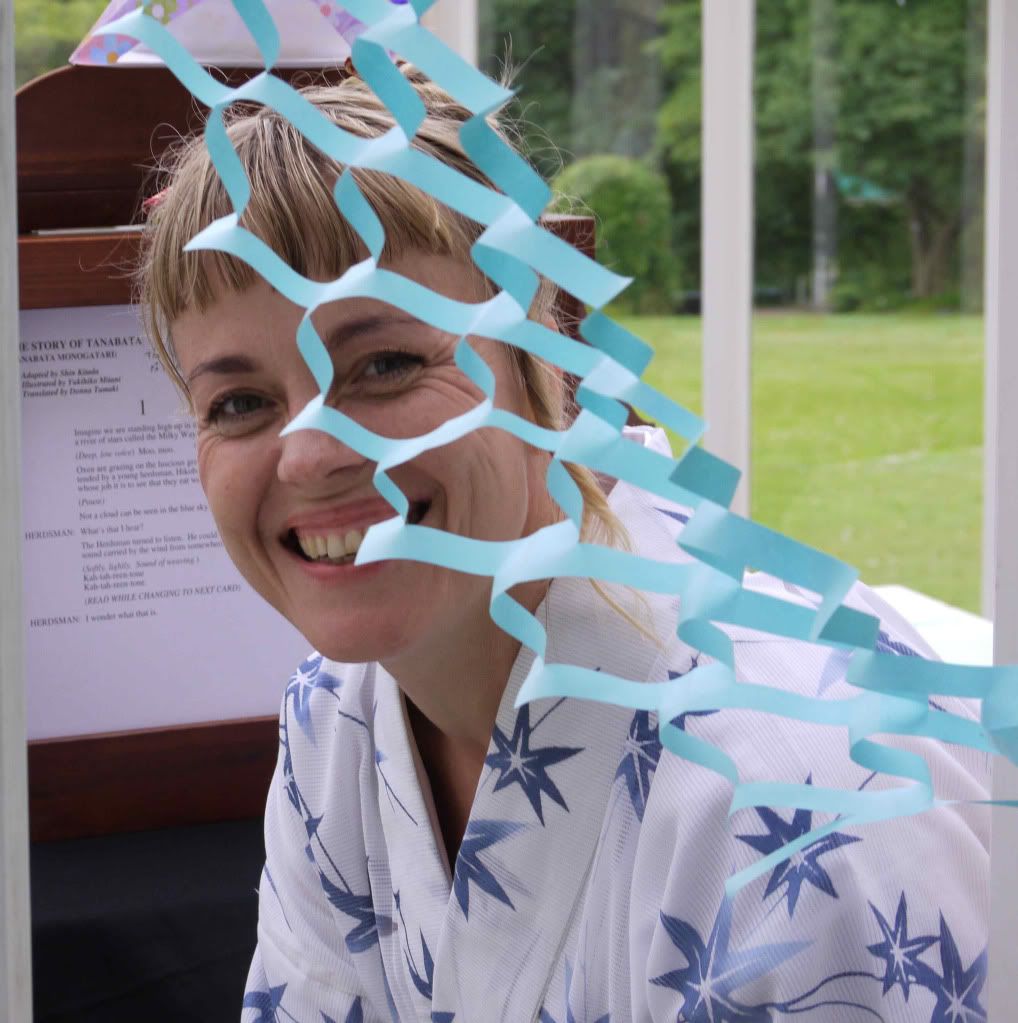 | | Ami Skanberg Dahlstedt of Sweden |
PLA Conference in Philadelphia PA March14-16
Table Top 13
Please drop by!
|
Kamishibai:
A Versatile Tool to Develop
Reading, Writing
and Oral Storytelling Skills | |
The Art of Japanese Paper Theater
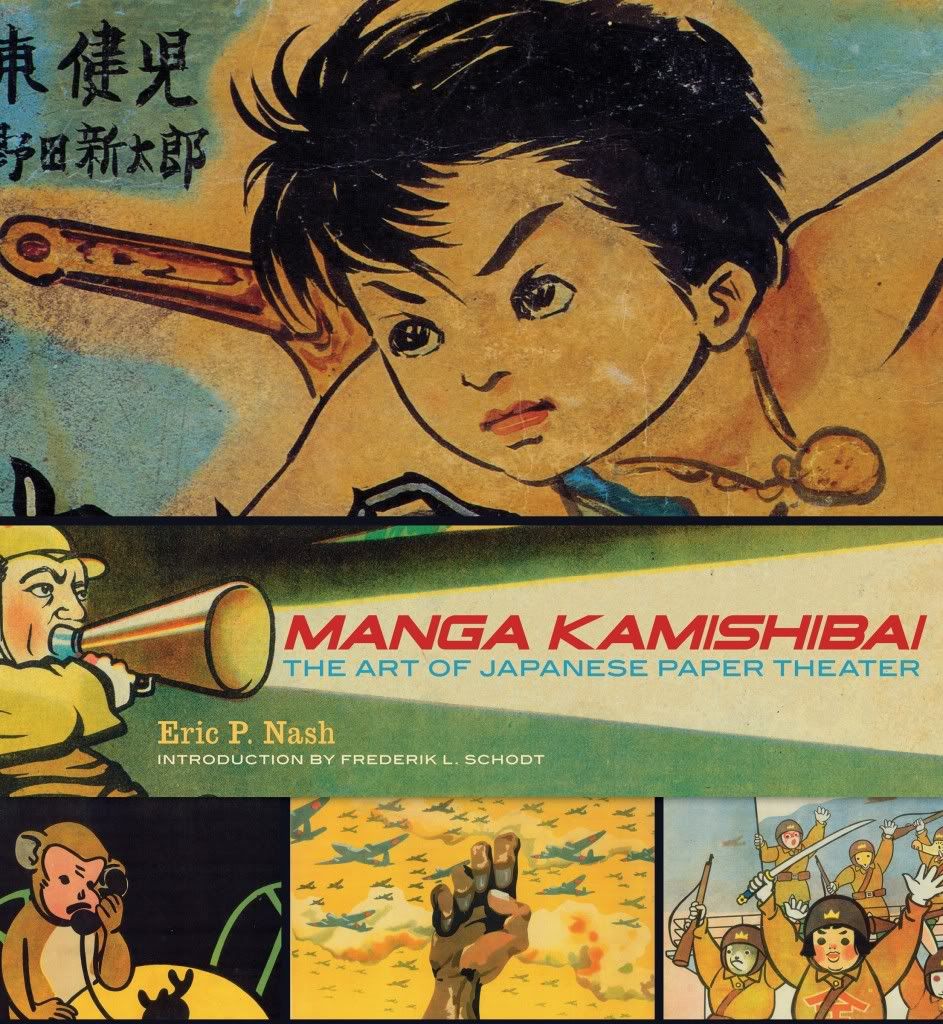
All kamishibai include a
Teacher's Guide
ClickTeacher's Guide
The Kamishibai Classroom
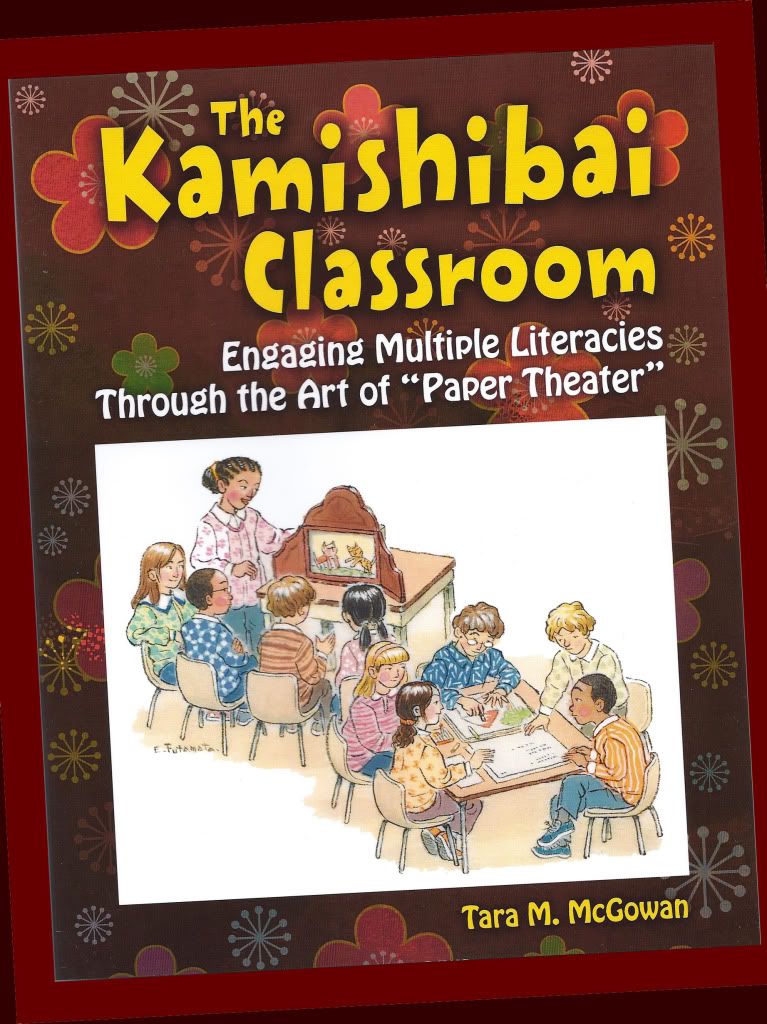 | | The Kamishibai Classroom: Engaging Multiple Literacies Through the art of "Paper Theater" by Tara McGowan |
Caldecott Medalist
Allen Say
Remembers
Kamishibai
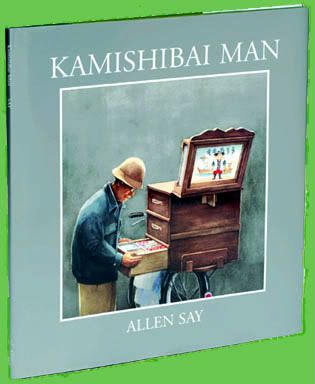 | |
Signed by the author |
For more information please go to our website!
 | | Jeffrey Dym's videos How to use kamishibai and Kamishibai in the classsroom |
|
|
The following inspirational Youtube link was posted by one of the Ohio University students.
Asian Zodiac Postcards
1 examples:
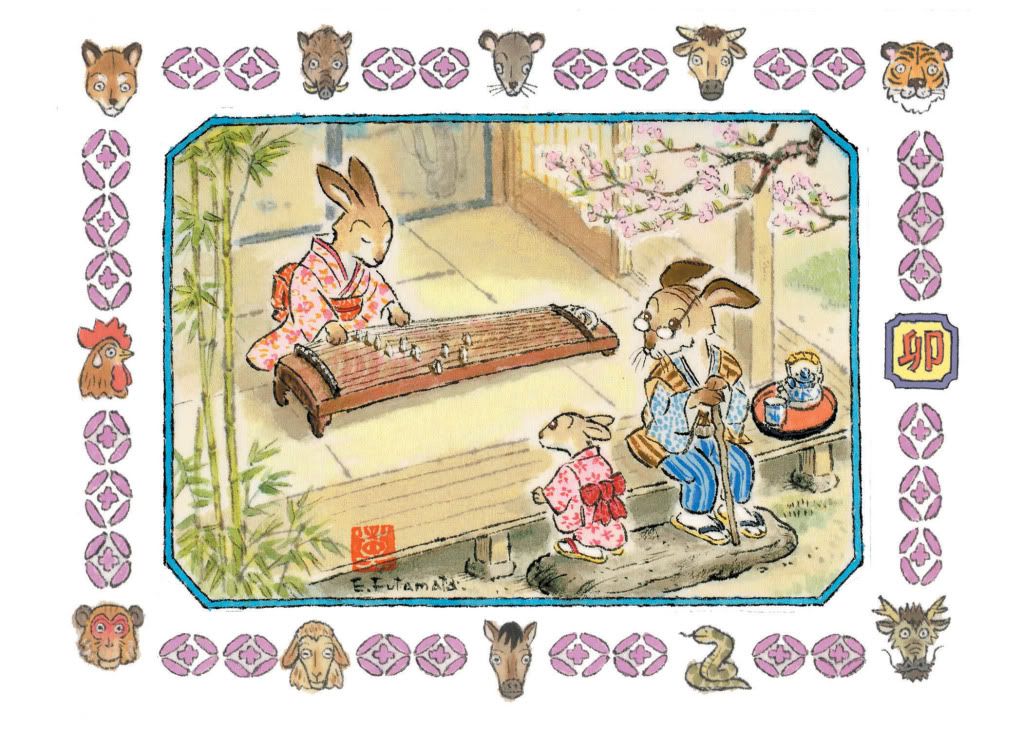 | |
One of thirteen Zodiac Postcards
The Year of the Rabbit |
|
|
|
Featured Kamishibai:
The Mouse's Wedding
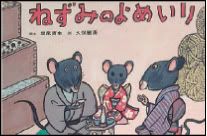
This tale has a skillfully crafted storyline that builds up to an ending which will surprise and delight both children and adults. The story is popular not only in Japan but in other parts of Asia as well.
Chukichi, a mouse suitor comes to Father Mouse seeking the hand of his charming daughter Chuko. But Chuko's father is determined to have her marry the mightiest, strongest creature in the world and sets off to persuade Mr. Sun, then Mr. Cloud, then Mr. Wind and finally Mr. Wall to marry her. Mr. Sun cannot shine when Mr. Cloud appears, Mr. Cloud is helpless when Mr. Wind blows and Mr. Wall stands firm when Mr. Wind is blowing. All have someone stronger than themselves. But Mr. Wall has his nemesis - none other than the mouse! In the end Father Mouse returns home and allows Chukichi to marry his daughter because he realizes that the mouse is the mightiest creature in the world! Children delight in the fact that the smallest creature turns out to be the mightiest. They learn that physical size is not important when judging an individual's true strength and that we all possess a different types of power and strength. Remember, it was the mouse, the tiniest creature of all who won the race of the animals and became the first of the twelve animals in the Chinese Zodiac! Seishi Horio, who adapted this tale, and Masao Kubo, the illustrator, were both pioneers in the movement to bring kamishibai, which had been a street performance art, into schools and libraries. The illustrations are true to the kamishibai style, with large, simple figures in scenes that are free of unnecessary details and easy to view from a distance.
The Mouse
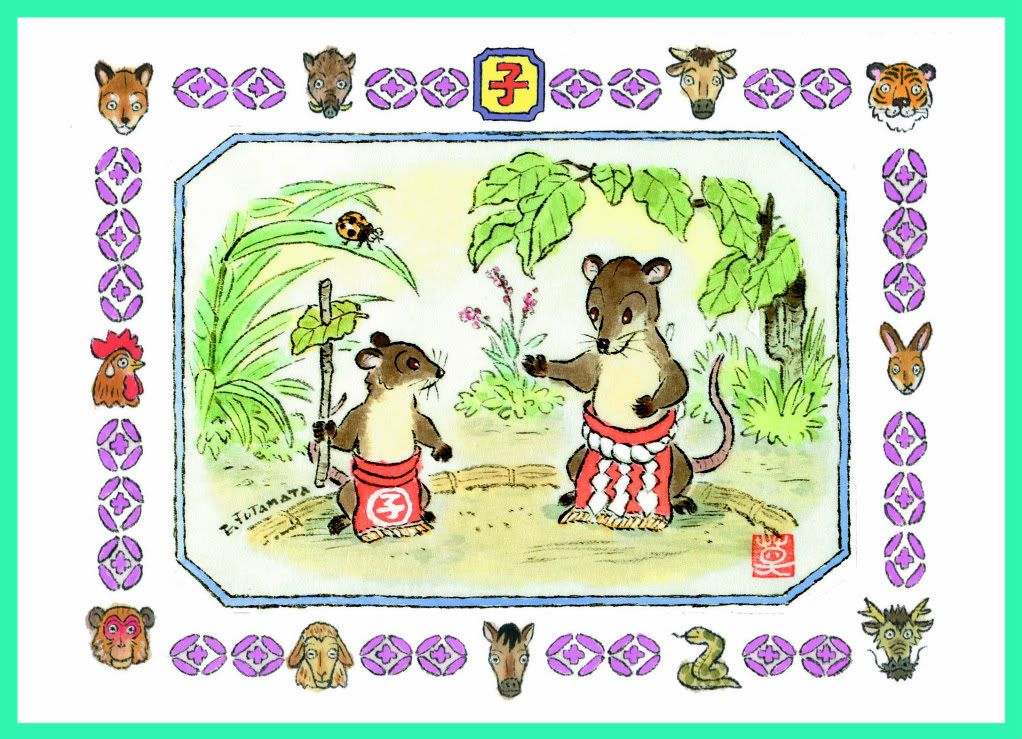 The mouse is a popular character in Japanese folklore and is generally admired for its quickness, cleverness and industry, despite the fact it can cause much damage to stored grains and homes. It is both feared and revered. The mouse appears in several of Kamishibai for Kids tales, including How the Years Were Named- in which the mouse, despite its size, outsmarts the other animals and wins the race to become the first animal in the 12-year Chinese zodiac cycle - and The Old Man and the Mice - in which mice bring wealth and good fortune to a kindly old man. The mouse is a popular character in Japanese folklore and is generally admired for its quickness, cleverness and industry, despite the fact it can cause much damage to stored grains and homes. It is both feared and revered. The mouse appears in several of Kamishibai for Kids tales, including How the Years Were Named- in which the mouse, despite its size, outsmarts the other animals and wins the race to become the first animal in the 12-year Chinese zodiac cycle - and The Old Man and the Mice - in which mice bring wealth and good fortune to a kindly old man.
|
Traditional Japanese
Wedding Attire
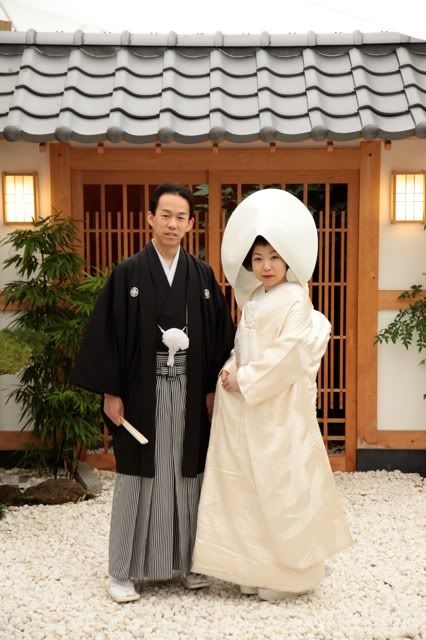 | | Hikaru and Yoko Tamaki |
Bride is wearing traditional white head covering and white uchikake over a white kimono.
Groom is wearing haori kimono jacket and pleated hakama trousers over black kimono. |
Ohio University
Humanitarian Relief Trip
 | |
Photo of Laurie performing kamishibai |
 We received a call in late summer 2011 from Laurie Fox, of Ohio University in Athens, Ohio www.ohio.edu. Laurie explained that she and several other faculty members were organizing a group of OU students, administrators and friends to volunteer with students and faculty from Iwate Prefectural University www.iwate-u.ac.jp/english to cooperate in a joint tsunami relief effort for one of the most devastated towns, Otsuchi, Iwate on Japan's northeastern coast. We received a call in late summer 2011 from Laurie Fox, of Ohio University in Athens, Ohio www.ohio.edu. Laurie explained that she and several other faculty members were organizing a group of OU students, administrators and friends to volunteer with students and faculty from Iwate Prefectural University www.iwate-u.ac.jp/english to cooperate in a joint tsunami relief effort for one of the most devastated towns, Otsuchi, Iwate on Japan's northeastern coast.
Laurie explained that the local yochien (preschool/kindergarten) had lost most of their supplies and that one item they would be very grateful to have was kamishibai! We were pleased to have the opportunity to respond to that request and assist with this significant, humanitarian project.
The OU group arrived in Otsuchi, Japan on 24 September 2011. A majority spent their time on a river clean-up project, while others visited the Osanago Yochien in Otsuchi. There, the volunteers taught songs and games to the children and performed kamishibai readings. They brought with them donations of books and kamishibai for the Osanago Yochien, plus financial contributions of over $1500 for the Otsuchi Disaster Relief Fund donated by over 30 individuals across the U.S. who wanted to support the service project.
Before returning home, the volunteers also began discussions with their Japanese colleagues with the goal of establishing a longer-term "sister school" connection with a preschool in the Athens, Ohio area.
|
|
A Special Message to Our Readers
from Our Good Friend, Tara McGowan
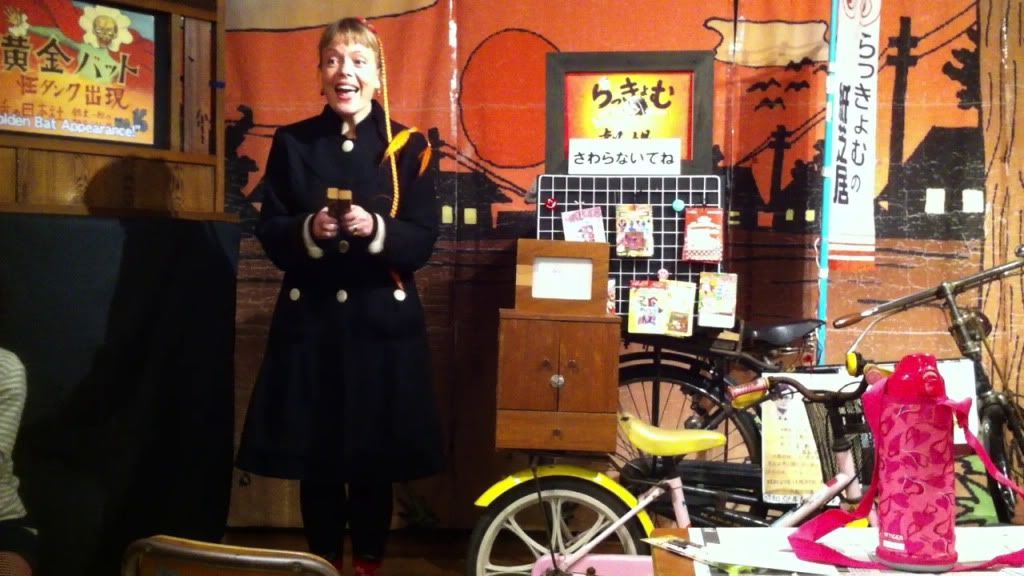 | | Ami Skanberg Dahlstedt from Sweden |
A Message to our Readers:
We are pleased to present the next in our series of interviews with people from around the globe who are doing interesting and different things with kamishibai. In this newsletter, we are featuring the work of Ami Skanberg Dahlstedt, a dancer, choreographer, and film director from Gothenburg, Sweden. Ami combines Japanese dance and movement with storytelling and crafts in the unique programs she creates for children and families.
Again, we would like to take this opportunity to invite you to be a part of our Global Kamishibai series. If you are doing new and exciting things with kamishibai and would like to contribute an interview, or if you know of someone you think we should contact for an interview (or even if you just have questions about kamishibai or the project) please email us at mcgowantara@gmail.com.
We look forward to hearing from you!
Tara McGowan, Margaret Eisenstadt, and Donna Tamaki
Tara McGowan is a doctoral candidate in the Language and Literacy in Education division of the University of Pennsylvania's Graduate School of Education. For more information about her research interests and work with kamishibai, see her website: www.taramcgowan.com. |
|
|
|
|